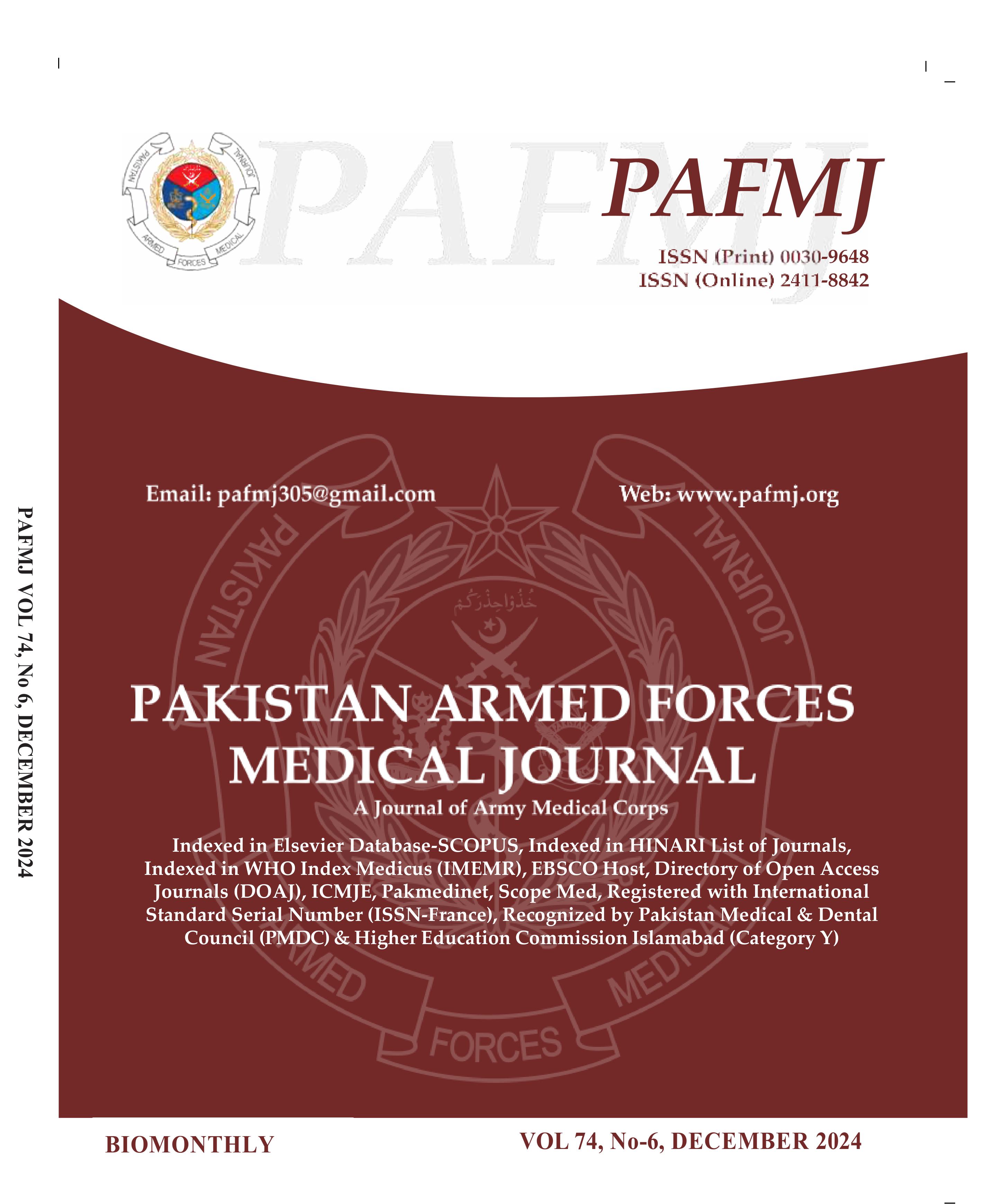Evaluation of Subclinical Thyroid Dysfunction in Patients with Type 2 Diabetes Mellitus
DOI:
https://doi.org/10.51253/pafmj.v74i6.8940Keywords:
Endocrinology, Thyroid Disorders, Thyroid Function Tests, Type 2 Diabetes Mellitus.Abstract
Objective: To evaluate subclinical thyroid dysfunction in Type II Diabetes Mellitus patients compared to healthy individuals.
Study Design: Cross-sectional study.
Place and Duration of Study: Department of Chemical Pathology and Endocrinology, Armed Forces Institute of Pathology, Rawalpindi Pakistan, from July 2021 to May 2022.
Methodology: A total of 437 participants, of which 207 had Type II Diabetes Mellitus and 230 had no comorbidities, were included in the study. Thyroid hormone levels were analyzed from serum samples by chemiluminescent method on automated immunoassay analyzer (Advia centaur). Mann-Whitney U test was applied to compare thyroid hormone levels between both groups, and p-value of ≤0.05 was regarded as significant. For risk assessment, frequency and odds ratios, with 95% confidence interval, were determined.
Results: There was a significant difference in the medians of Thyroid Stimulating Hormone (p=0.002) and total Triiodothyronine (T3) (p=0.004), while no significant difference was observed in the medians of Free Thyroxine (fT4) (p=0.573) between patients with Type II Diabetes and healthy participants. Diabetic participants had a higher frequency of subclinical thyroid dysfunction than healthy individuals (36% vs 1.3%). Diabetic patients had a greater risk of subclinical thyroid dysfunction than healthy participants (OR: 2.62 vs 0.06) while female participants risk of thyroid dysfunction was higher than males.
Conclusion: Risk of subclinical thyroid dysfunction was greater in Type II Diabetes Mellitus patients while subclinical hypothyroidism was the most common thyroid dysfunction.
Downloads
References
Ozair M, Noor S, Raghav A. Prevalence of thyroid disorders in North Indian type 2 diabetic subjects: A cross-sectional study. Diabetes Metab Syndr 2018; 12(3): 301–304.
https://doi.org/10.1016/j.dsx.2018.01.024
Elgazar EH, Esheba NE, Shalaby SA, Mohamed WF. Thyroid dysfunction prevalence and relation to glycemic control in patients with type 2 diabetes mellitus. Diabetes Metab Syndr 2019; 13(4): 2513–2517. https://doi.org/10.1016/j.dsx.2019.07.020
Ramachandran A. Trends in prevalence of diabetes in Asian countries. WJD 2012; 3(6): 110.
https://doi.org/10.4239/wjd.v3.i6.110
Pakistan ranks 3rd in prevalence of diabetes in world after China and India' [Internet]. Available from:
https://www.thenews.com.pk/print/899124-pakistan-ranks-3rd-in-prevalence-of-diabetes-in-world-after-china-and-india [Accessed on September 10, 2024]
33m Pakistani adults living with diabetes: Report' [Internet]. Available from:
https://www.thenews.com.pk/print/908338-33m-pakistani-adults-living-with-diabetes-report [Accessed on September 24, 2024]
Ogbonna S, Ezeani I, Okafor C, Chinenye S. Association between glycemic status and thyroid dysfunction in patients with type 2 diabetes mellitus. DMSO 2019; 12: 1113–1122.
https://doi.org/10.2147/DMSO.S215104
Raghuwanshi PK, Rajput DPS, Ratre BK, Jain R, Patel N, Jain S, et al. Evaluation of thyroid dysfunction among type 2 diabetic patients. Asian J Med Sci 2014; 6(3): 33–37.
https://doi.org/10.3126/ajms.v6i3.11738
Biondi B, Kahaly GJ, Robertson RP. Thyroid dysfunction and diabetes mellitus: Two closely associated disorders. Endocr Rev 2019; 40(3): 789–824.
https://doi.org/10.1210/er.2018-00163
Tang Y, Yan T, Wang G, Chen Y, Zhu Y, Jiang Z, et al. Correlation between insulin resistance and thyroid nodule in type 2 diabetes mellitus. Int J Endocrinol 2017; 2017: 1–8.
https://doi.org/10.1155/2017/6025376
Hussain A, Ali I. Diabetes mellitus in Pakistan: a major public health concern. Arch Pharm Pract 2016; 7(1): 30–33.
Jali MV, Kambar S, Jali SM, Pawar N, Nalawade P. Prevalence of thyroid dysfunction among type 2 diabetes mellitus patients. Diabetes Metab Syndr 2017; 11: S105–108.
https://doi.org/10.1016/j.dsx.2016.12.015
Khan NZ, Muttalib MA, Sultana GS. Association of thyroid hormone levels among type 2 diabetic patients attending a tertiary care hospital. Bangladesh Med Res Counc Bull 2016; 42(2): 90–94. https://doi.org/10.3329/bmrcb.v42i2.29799
Islam S, Delwar ZM, Khan SA, Yesmine S. A comparative study of thyroid hormone levels in young diabetic and non-diabetic patients. Int J Diabetes Dev Ctries 2014; 34(1): 7–9.
https://doi.org/10.1007/s13410-013-0128-2
Uppal V, Vij C, Bedi GK, Vij A, Banerjee BD. Thyroid disorders in patients of type 2 diabetes mellitus. Indian J Clin Biochem 2013; 28(4): 336–341. https://doi.org/10.1007/s12291-013-0338-6
Palma CC, Pavesi M, Nogueira VG, Clemente EL, Vasconcellos MF, Pereira LC, et al. Prevalence of thyroid dysfunction in patients with diabetes mellitus. Diabetol Metab Syndr 2013; 5(1): 58. https://doi.org/10.1186/1758-5996-5-58
Mamun MSA. Thyroid hormonal status in newly diagnosed type 2 diabetes mellitus. Bangladesh J Nucl Med 2018; 20(1): 27.
https://doi.org/10.3329/bjnm.v20i1.36857
Papazafiropoulou A, Sotiropoulos A, Kokolaki A, Kardara M, Stamataki P, Pappas S. Prevalence of thyroid dysfunction among Greek type 2 diabetic patients attending an outpatient clinic. J Clin Med Res 2010; 2(2): 75.
https://doi.org/10.4021/jocmr2010.03.290e
Ogbonna SU, Ezeani IU. Risk factors of thyroid dysfunction in patients with type 2 diabetes mellitus. Front Endocrinol 2019; 10: 440. https://doi.org/10.3389/fendo.2019.00440
Wang C. The relationship between type 2 diabetes mellitus and related thyroid diseases. J Diabetes Res 2013; 2013: 1–9.
Downloads
Published
Issue
Section
License
Copyright (c) 2024 Momna Arooj Malik, Momna Arooj Malik, MAM, Zujaja Hina Haroon, Afshan Bibi, Muhammad Usman Munir, Muhammad Younas

This work is licensed under a Creative Commons Attribution-NonCommercial 4.0 International License.















